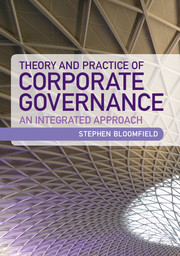Book contents
- Frontmatter
- Contents
- List of Figures and Tables
- Introduction
- Part 1 The Discipline of Governance
- Part 2 The Relationship between Law and Governance
- Part 3 Governance and the Listed Company
- Part 4 Governance and Regulation
- Chapter 9 The company and the stock market
- Chapter 10 Non-shareholder regulation of companies
- Chapter 11 Changes in regulatory structures – the PRA, the FCA and the ICB recommendations
- Chapter 12 Failure – the abiding characteristic of regulation
- Chapter 13 Accounting for profits: the root of information asymmetry
- Chapter 14 Reward and performance
- Part 5 Counter-governance: Failures of governance and corporate failure
- Bibliography
- Index
- References
Chapter 9 - The company and the stock market
from Part 4 - Governance and Regulation
Published online by Cambridge University Press: 05 March 2013
- Frontmatter
- Contents
- List of Figures and Tables
- Introduction
- Part 1 The Discipline of Governance
- Part 2 The Relationship between Law and Governance
- Part 3 Governance and the Listed Company
- Part 4 Governance and Regulation
- Chapter 9 The company and the stock market
- Chapter 10 Non-shareholder regulation of companies
- Chapter 11 Changes in regulatory structures – the PRA, the FCA and the ICB recommendations
- Chapter 12 Failure – the abiding characteristic of regulation
- Chapter 13 Accounting for profits: the root of information asymmetry
- Chapter 14 Reward and performance
- Part 5 Counter-governance: Failures of governance and corporate failure
- Bibliography
- Index
- References
Summary
This chapter will consider the following issues:
how well stock exchanges actually acquit their primary function of mobilising the financial resources of many small savers to supply large amounts of capital for industry and commerce;
how shareholders are then treated – in terms of corporate governance issues raised by traditionalist theories of governance;
whether the market mechanisms founded on the traditionalist theories acquit their supposed functions in terms of efficiency of resource allocation.
Introduction
As with other aspects of the traditionalist theories of governance in previous chapters, this chapter will contend that the traditionalist, conventional theoretical descriptions of what markets do and how they support procedural, behavioural and structural governance are different from how stock markets work in practice. This is mostly because the traditionalist view starts from the assumption of two problematic positions: first, it employs the conceit that the financial market is close to ‘perfection’ in the economic sense and second, it assumes that all trades are undertaken by potential long-term holders of shares – in other words that all shareholders are investors, in the sense that they have some concept of stewardship at heart based on the privileges of ownership. We have already seen that the concept of the share in a listed company conferring what would normally be recognised as ‘ownership’ is a specious one: possession of a share in a listed company is effectively a limited ticket to participate in some uncertain financial benefits with extremely limited associated rights to receipt of backward-looking information. Stock markets conflate the very different attitudes of both trader and investor and try to impose obligations on the resulting composite which simply do not fit the reality of the market.
- Type
- Chapter
- Information
- Theory and Practice of Corporate GovernanceAn Integrated Approach, pp. 201 - 229Publisher: Cambridge University PressPrint publication year: 2013



